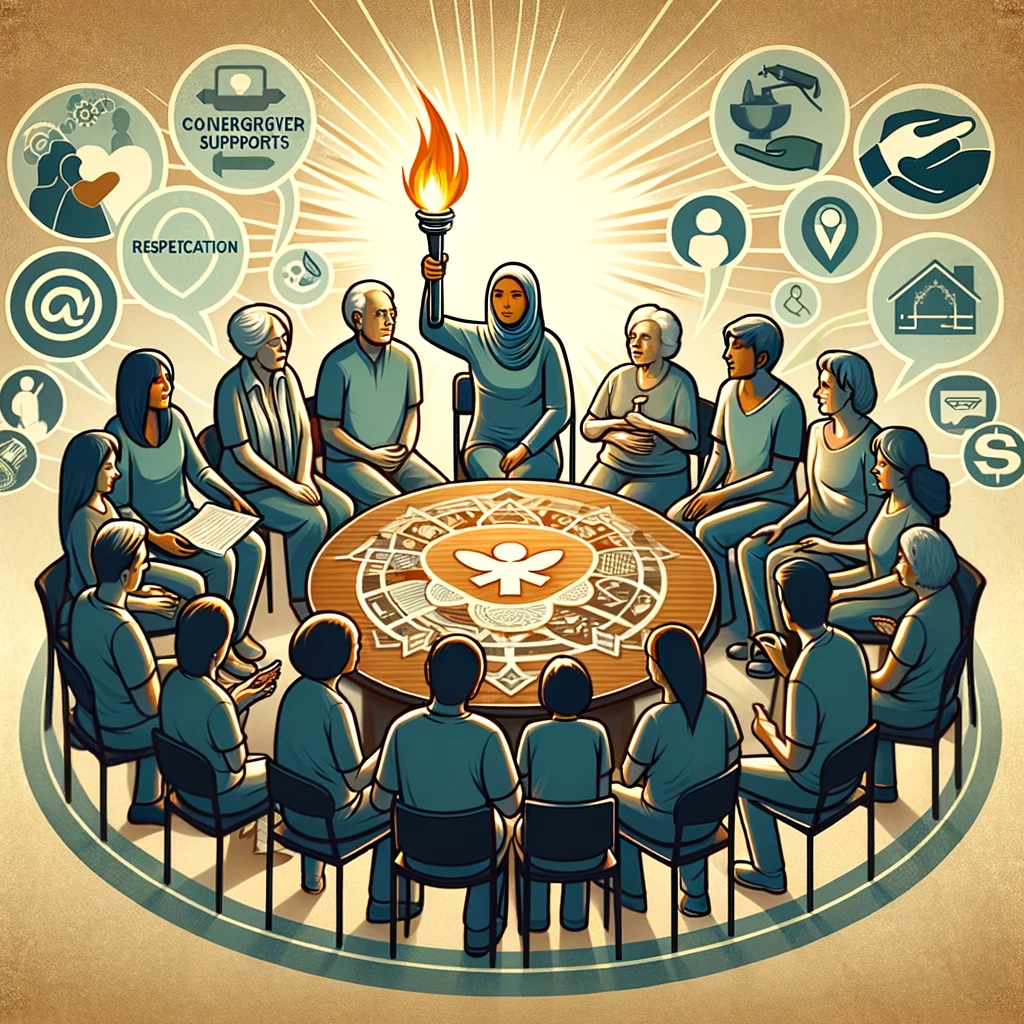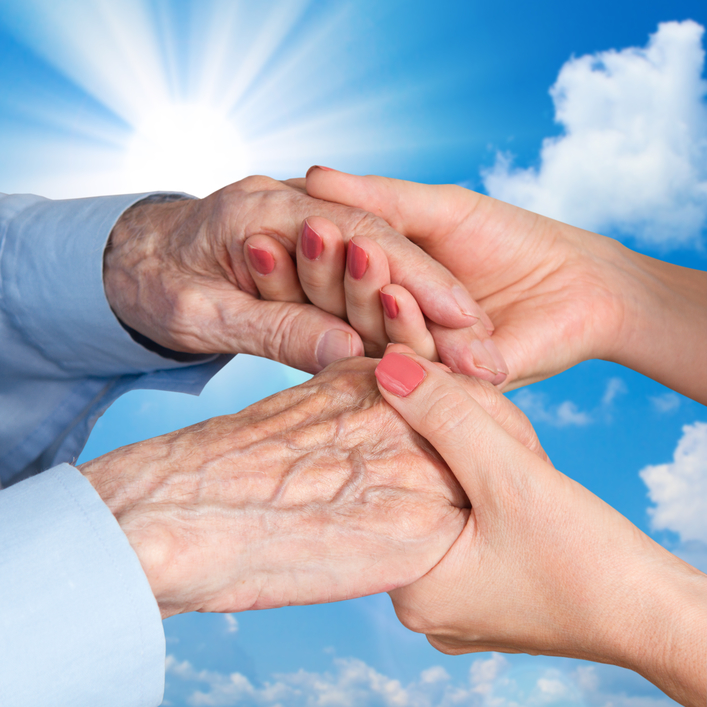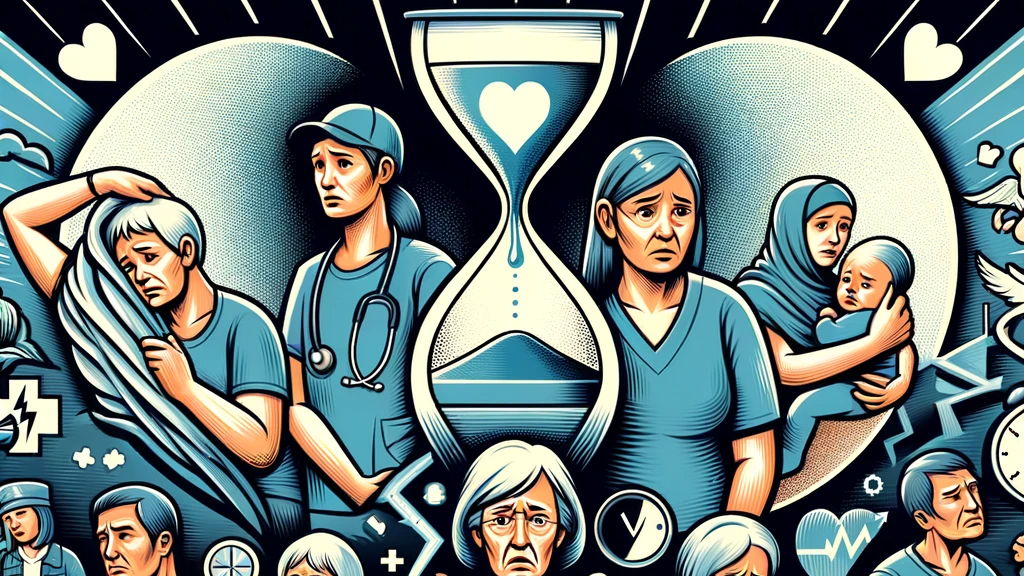The Unseen Heroes: A Tribute to Spousal Caregivers and Their Unwavering Support
The Unseen Heroes" honors spousal caregivers, showcasing their unwavering support and sacrifices. It highlights the physical, emotional, and financial challenges they face daily, while emphasizing their resilience and dedication in caring for their partners.

Brian writes,
I have been cared for by my wife for over 20 years. I am not the caregiver. I am the one being cared for, I have an overwhelming level of understanding of the impact caregivers have in my life. That is because all I can do is lay here and watch the world go by.
I was in an auto accident in 2004 where I sustained a crippling spinal cord injury. I was unable to do nearly anything without causing myself more severe pain.
I am in severe pain all the time. When I move, the pain become so bad my brain would shut down. I am unable to stand, or sit, walk, bend, lift, sneeze, cough, breathe, burp or fart without increasing my pain to levels that are unbearable.
My amazing wife has been the one that’s taken care of me this whole time. Without her I would have died. She saved my life several times over. What I’m dealing with causes me to be very selfish. When everything you do makes you feel more pain, you feel miserable. You tend to really close off everything else.
Yet my wife still puts up with me. She has helped me both physically and mentally supported me along my journey. She didn’t take crap from me when I become angry and frustrated. She is always there for me. Since my injury, my wife has had to work to take care of me. She takes care of our kids, our house and our home management.
My wife takes care of me every single day. She does not get a break.
My wife has not received help that she needs. Finally, after almost 10 years of being lied to by State Farm, we realize that she deserved being paid for what she’s doing. After two years of claim attendant care, they reduced what they pay her to two hours a week. And I am left without any pain management.
I am completely bedridden. I’ve hurt myself, trying to take care of myself. I black out from the pain when it gets too much. I fall easily. Every time my wife has been there to catch me.
We’ve had one form of income for quite a few years. My Social Security. It was not even enough to pay for a place to live. Yet she figured out how to borrow, sell her stuff and we survived.
It’s been almost 20 years since my accident. 20 years that she has not had a moment to herself. She didn’t get a break when she hurt herself. She didn’t get a break when her brother committed suicide less than 500 feet from our house. She’s put her own health issues aside, because she doesn’t have time.
She has had to sacrifice and suffer with poverty. We often do not enough money for even groceries. Then my wife is dealing with being bombarded with constant, draining depression, watching me in my misery. Caregiver stress and burnout syndrome is real. And it is dangerous. The insurance companies do everything they can to make sure you don’t get what you deserve. I pray we all start fighting back.
I know we don’t have the energy. This is a very draining way to live for everybody. I think it would be amazing if these companies actually stepped up and did what they were paid for. This is not what a caregiver deserves she deserves better without her. I have no one.

Brian, I want to address the challenges you have brought to light. Your story is all too common. The lack of support for the family caregiver is lacking in the US. Spousal caregivers are ignored by extended family members for any type of support.
The Overlooked Heroes: Spousal Caregivers and Their Sacrifices
Spousal caregivers are often the unsung heroes in the healthcare world. Brian’s story is a stark reminder of this. His wife, like many others in her position, has endured nearly two decades of caregiving following his devastating spinal cord injury. This relentless dedication showcases the emotional and physical toll taken on spousal caregivers, who manage the delicate balance between their roles as partners, parents, and primary caregivers. There are many different helpful resources. A spouse caregiver support group is just one example how spouse caregivers share their emotions, challenges and obstacles they face with other spousal caregivers.
The Financial and Emotional Burden of Caregiving: A Deeper Look
The plight of family caregivers is often invisible to the broader public, yet their struggles are real and profound. Statistics reveal a grim reality: family caregivers, like Brian's wife, provide an estimated $650 billion worth of unpaid care annually. This staggering figure, however, doesn't translate into financial stability for them. Instead, many face a dire financial situation, grappling with the inability to work outside the home and coping with the lack of affordable respite care.
Financial Strain and the Path to Poverty
The financial impact on family caregivers is severe. With their time and energy devoted to caregiving, many are unable to hold regular jobs, leading to a significant loss of income. The situation is exacerbated by the lack of financial support from government or private insurance, leaving many caregivers financially devastated. They struggle with basic needs, such as putting food on the table and paying utility bills. The absence of a stable income also means that saving for their future becomes a distant dream, plunging them further into financial insecurity.
The High Cost of Inadequate Respite Care
The scarcity of affordable respite care adds another layer of hardship. Respite care, which provides temporary relief to caregivers, is often too costly for many families. Without these breaks, caregivers are at a higher risk of physical and emotional burnout. Constant caregiving without adequate rest or support can lead to serious health issues, including chronic stress, depression, and physical ailments.
Health Consequences of Self-Neglect Among Caregivers
The Cost of Neglected Health in Caregiving
In the world of caregiving, particularly among spousal caregivers and family members, self-care often becomes a neglected aspect. The all-consuming nature of caregiving responsibilities - ranging from medical assistance to emotional support - leads many caregivers to overlook their health and wellness. Neglecting regular medical check-ups, healthy eating habits, exercise routines, and mental health support is a common yet perilous trend among caregivers. This oversight can have grave consequences not only for the caregiver but also for the care recipient.

Rising Health Risks for Caregivers
Research has consistently shown that the stress associated with caregiving is linked to an increased risk of health problems. The intense and often unrelenting stress faced by caregivers, especially those in roles like spousal caregiver or well spouse, can lead to a range of health issues. These include, but are not limited to, hypertension, depression, anxiety, and a weakened immune system. In extreme but not uncommon cases, the physical and emotional toll can be so severe that caregivers fall ill or even pass away prematurely, which in turn necessitates alternative care arrangements for the dependent individual.
The Emotional Toll and Its Impact
The emotional well-being of caregivers is just as critical as their physical health. Caregivers, often engaged in providing emotional support to their partners or family members, are prone to experiencing heightened levels of stress, anxiety, and depression. The lack of adequate support from groups, whether it be spouse only group, caregiver support groups, online support groups, or caregiver support groups, can exacerbate feelings of isolation and helplessness.
Consequences for the Care Recipient
When a caregiver's health deteriorates, it directly impacts the quality of care they can provide. In situations where the caregiver is the primary support for taking care of, such as with spousal caregivers or adult children caring for aging parents, their inability to continue caregiving can lead to significant disruptions in the care recipient's life. This often results in the need for alternative care settings, which can be emotionally and financially challenging for the family.
The Need for Comprehensive Support Systems
It's essential to recognize the importance of comprehensive support systems for caregivers. This includes access to caregiver support groups, emotional and mental health resources, and practical assistance. Groups like the well spouse association and other spousal caregiver support group networks can provide invaluable support. Additionally, resources and advice from organizations like AARP and related websites can offer guidance and tips for managing the challenges of caregiving.
Advocating for Better Health and Wellness Practices
Caregivers must be encouraged and supported to prioritize their health and wellness. This means advocating for regular health check-ups, ensuring they have time for self-care, and providing them with resources to manage their emotional well-being. Encouraging caregivers to join support groups, seek professional help when needed, and connect with fellow caregivers can play a crucial role in mitigating the effects of caregiver stress.
The health consequences of neglecting self-care are a critical issue in the caregiving community. Addressing this requires a concerted effort to provide caregivers with the support and resources they need to maintain their health and well-being while they perform their invaluable role in supporting people caring for their loved ones.
The Ripple Effect of Caregiver Illness and Mortality
When a caregiver becomes seriously ill or dies prematurely, the impact is twofold. Firstly, it places the care recipient in a precarious situation, often necessitating placement in a care facility, which can be disruptive and distressing. Secondly, it highlights a critical gap in our healthcare system: the need for robust support structures for caregivers, including financial assistance, accessible respite care services, and health and wellness programs.

The Need for Supportive Networks and Advocacy
In this challenging landscape, the role of spouse caregiver support groups, online support groups, and well spouse associations becomes crucial. These groups provide emotional support, practical advice, and a sense of community. They also play a key role in advocating for policy changes to address the needs of family caregivers. Ensuring caregivers have access to affordable respite care, financial support, and resources for their own health and well-being is not just a matter of individual concern but a societal obligation.
The financial and emotional burdens borne by family, friends and caregivers demand our attention and action. By acknowledging their struggles and advocating for comprehensive support systems, we can begin to address the needs of this vital yet often overlooked group in our society.
Health Impacts on Caregivers: A Hidden Crisis
The stress and burden of caregiving do not just affect the wallet but the relationships and also the health of the caregivers. Many develop chronic illnesses due to the relentless stress, and the impact of caregiver stress can linger long after the caregiving role has ended. This situation highlights a hidden health crisis among caregivers that often goes unnoticed and unaddressed.
Building Support Networks: The Role of Caregiver Support Groups
To combat these challenges, it’s crucial for caregivers to build strong support networks. This includes forming care team partner support groups and joining existing structures like online support groups, spousal caregiver groups, and well spouse associations. These networks provide emotional support, practical advice, and a community of individuals who understand the unique challenges of caregiving.
Advocating for Change: The Need for Policy Reforms and Public Awareness
The article emphasizes the need for public awareness and policy reform to address the growing aging population and caregiver crisis. It’s not just about recognition but about tangible support – financial compensation, regular and affordable respite care, and the establishment of care team partner support groups to provide practical assistance.
Taking Action: The Caregiver Relief Family Caregiver and Direct Care Worker Petition
In conclusion, the article calls for readers to take action by signing and sharing the Caregiver Relief Family Caregiver and Direct Care Worker petition. This petition advocates for financial compensation and benefits for family caregivers, regular and affordable respite care, and the creation of Care Team Partner support groups. By building a team of advocates for both the caregiver and the care recipient, we can begin to address and alleviate the challenges faced by countless family caregivers.
FAQ Section: Support for Spousal Caregivers
What is a spouse caregiver support group and how can it help me?
A spouse caregiver support group is a community of individuals who are caring for their spouses. These groups provide emotional support, practical advice, and a platform to share experiences. Joining such a group can help reduce feelings of isolation and provide coping strategies.
Are there online support groups for spousal caregivers?
Yes, there are many online support groups specifically for spousal caregivers. These platforms offer convenience and accessibility, allowing caregivers to connect with others, share experiences, and access resources from anywhere.
How can adult children support their parents who are spousal caregivers?
Adult children can support their spousal caregiver parents by offering emotional support, helping with caregiving tasks, and providing resources or information about available support groups and services.
What is the Well Spouse Association?
The Well Spouse Association is a nonprofit organization dedicated to addressing the needs of individuals caring for a chronically ill or disabled spouse. They offer support through local chapters, respite events, and advocacy efforts.
How can joining a caregiver support group benefit me?
Joining a caregiver support group can provide numerous benefits, including emotional support, a sense of community, access to helpful resources, and the opportunity to learn from the experiences of others in similar situations.
What types of challenges do spousal caregivers face?
Spousal caregivers often face a variety of challenges, including emotional and physical stress, financial strain, and balancing caregiving with other responsibilities. They may also experience feelings of isolation and depression.
How can I access resources for spousal caregivers?
Resources for spousal caregivers can be accessed through local health services, caregiver organizations, online platforms, and support groups. Websites like AARP also offer a range of tips and information for caregivers.
What advice is available for new spousal caregivers?
New spousal caregivers are advised to seek support from groups, educate themselves about the condition their spouse is facing, take time for self-care, and consider professional counseling if feeling overwhelmed.
How can caregivers cope with the emotional challenges of caregiving?
Caregivers can cope with emotional challenges by seeking support from friends, family, or support groups, practicing self-care, engaging in activities they enjoy, and considering professional help if needed.
Are there any free resources available for spousal caregivers?
Yes, many organizations offer free resources for spousal caregivers, including online support groups, educational materials, and access to community-based programs. Websites and services like AARP often have sections dedicated to caregiver support.
You might also like this article:









